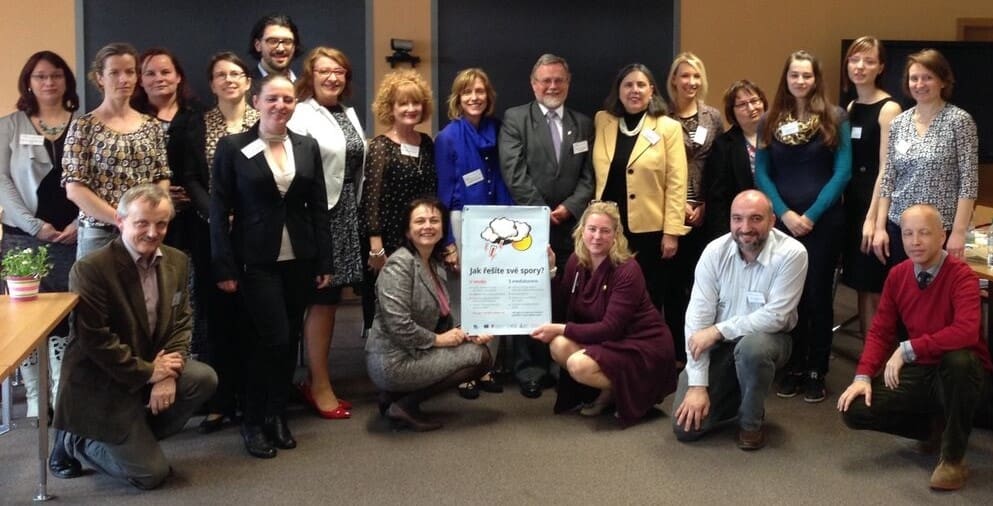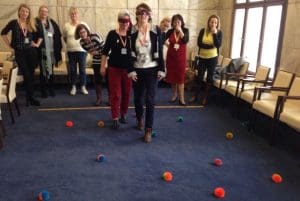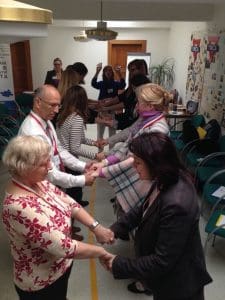Exploring the Use of Community Mediation in the Czech Republic
By Natasha Dyer

Community mediation is a service offered by community leaders to its members to address and resolve conflict locally. Community mediation requires people to mobilize, collaboratively problem-solve and find positive ways to live and work together. MBBI’s Dialog Process Project (DPP) found its own community in Prague, when they met with Czech mediation partners European Institute for Peace, Mediation and Arbitration (ESI) at the end of March 2016 to provide mediation training and explore the possibility of offering community mediation.
Team leader, professor, transformative high conflict mediator, conflict systems design consultant and executive conflict coach, Nan Waller Burnett, from Colorado, was joined by Rachel Wohl, a mediator, lawyer and mindfulness trainer from Maryland and Katherine Triantafillou, mediator, lawyer, facilitator and local government specialist from Massachusetts. Supporting them were Sarah Breger, MBBI intern from Canada and Natasha Dyer, a half-Czech international communications specialist from London and lead writer for MBBI’s website.
The Czech mediation partners Eva Vankova, Marie Bohacova and Lenka Saloumon from ESI hosted MBBI and worked with them to design a dialogue-based workshop that would most usefully share the team’s international knowledge and experience with those looking to use mediation to solve conflicts in their own personal and professional contexts. They also ensured that participants were well fed and watered with local Czech delicacies such as chlebicky (open sandwiches) and kolace (sweet pastries), washed down with famously good draft beer. At one point, a team lunch was even accompanied by a local jazz band!
 The resulting community mediation workshop provided fun and interactive mediation training to: teachers, social workers, lawyers, local government workers, students, parents and a professional businessman and career coach. MBBI facilitators employed playful but instructional games with props such as blindfolds and juggling balls, as well as roleplays to simulate everyday conflict situations and the mediation process between families or neighbours. This was interspersed with discussion, debate (and much good humour) about the hallmarks of successful community mediation, ethical dilemmas and appropriate methods in the Czech context.
The resulting community mediation workshop provided fun and interactive mediation training to: teachers, social workers, lawyers, local government workers, students, parents and a professional businessman and career coach. MBBI facilitators employed playful but instructional games with props such as blindfolds and juggling balls, as well as roleplays to simulate everyday conflict situations and the mediation process between families or neighbours. This was interspersed with discussion, debate (and much good humour) about the hallmarks of successful community mediation, ethical dilemmas and appropriate methods in the Czech context.
The workshop was delivered in both Czech and English thanks to the help of star law students from Charles University Law School, Pavlina Krausova, Michael Hermanova, and their professor Dr. Martin Svatos. The students had already shown their interest in the topic by establishing a student mediation clinic within their peer group. (While in Prague, the MBBI team also presented an active listening lecture at the Charles University Law School for Dr. Svatos’ conflict resolution class.)
A central part of the MBBI workshop for ESI focused on exploring what community mediation would mean in practice in the Czech Republic—specifically in the Bohemian town of Hradec Kralove, the town of Elisabeth Richeza of Poland , Wenceslaus II and Rudolph I of Hapsburg.
Prior to MBBI’s visit, ESI discovered an interest among Hradec Kralove residents to explore whether community mediation would prove effective in dealing with their local conflict issues, such as with minority groups, in small business disputes or domestic violence cases. A roundtable discussion was then arranged between MBBI, ESI and Hradec Kralove government officials, business people, university and social workers to explore this. The meeting was well-attended by a range of high profile figures including Senator Hroska, an influential political figure, and members of local media turned up to report on the discussion.
Though it was clear that the establishment of a community mediation centre to address conflict in Hradec Kralove will not happen soon, there was ample desire to look into practical possibilities of putting it in place. Participants were also keen to continue learning from their MBBI colleagues’ international experiences of establishing or supporting successful community mediation centres.
Both the workshop and meeting revealed that the Czech Republic’s history has created social dynamics that could obstruct willingness for the practice of community mediation. A society that spent 10 years under control of Germany and then 40 years under the control of the USSR, is skeptical about community-based mobilization or problem-solving— let alone trusting a stranger to help solve a personal problem. For similar reasons, there is no long-term history of volunteering. Advocacy would therefore be vital to communicate the benefits of solving conflict through mediation as opposed to through the courts.
Despite this, there was a strong sentiment that mediation’s relative ease and efficiency would prove a popular alternative to the protracted court proceedings endemic in the Czech Republic. Given their history, Czechs are often frustrated with old fashioned ways of doing things and determined to find solutions. Community mediation provides them with a new way to tackle widespread conflict issues.
Following the visit, the DPP team will continue to coach and support ESI on a monthly basis to further the prospect of community mediation in Hradec Kralove and beyond. Support from Charles University, local government and businesses means it could happen sooner than expected. As a result of the MBBI community mediation training, ESI has now enlisted the Charles University mediation clinic started by ESI interns Krausova and Hermanova, as part of its work. The grand opening was on May 11, 2016 and was attended by the MBBI/DPP team on Skype.
